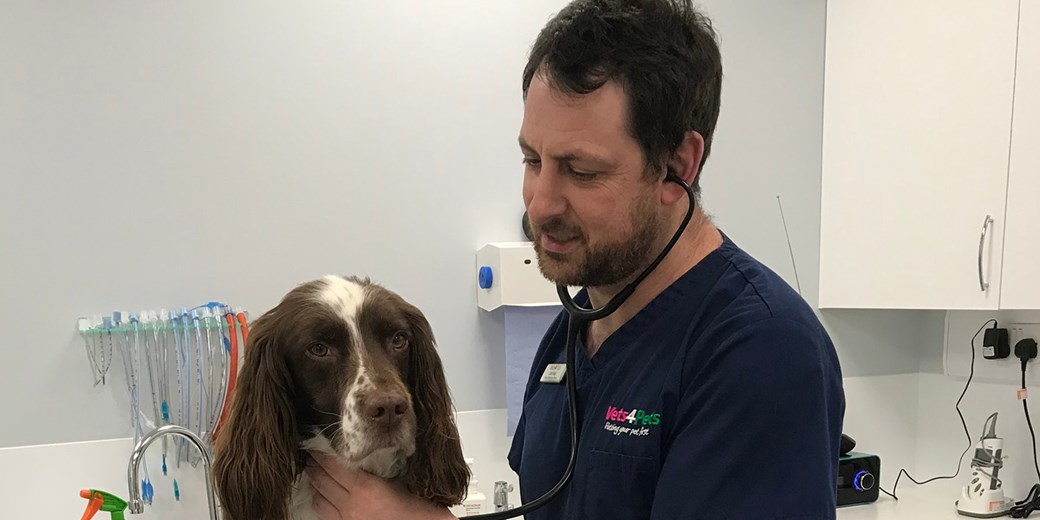
Blog: Vets4Pets Alsager Receives Autism Friendly Award
Vets4Pets Alsager recently became the first veterinary surgery to receive the National Autistic Society’s Autism Friendly Award, which recognises businesses that have made themselves more accessible to autistic people and their families.
The five criteria every business needs to satisfy to be autism friendly are: customer information, staff awareness, physical environment, customer experience, feedback and consultation, and promoting understanding.
Carl May, a RVN (registered veterinary nurse) and the Joint Venture Partner (JVP) of Vets4Pets Alsager, applied for the award after becoming aware of the number of children on the autism spectrum coming into the Alsanger practice. Carl was interested to know if and how aspects of his practice such as lights, smells and noises could negatively affect clients, making it more difficult for them to visit the practice and therefore, best manage their pets’ health.
“You can’t tell who is on the spectrum,” says Carl. “And, if you ask, some people may be pleased that you asked, and others may not be, whether they are on the spectrum or not. We ourselves may be on the spectrum and not even know.”
According to the National Autistic Society, “autism is a lifelong disability which affects how people communicate and interact with the world. There are approximately 700,000 autistic adults and children in the UK.”
“I just thought I needed to understand a bit more about autism so I could be more understanding and empathetic and encourage empathy from my team,” says Carl. “The module I completed through the National Autistic Society helped me to better understand autism and provided me, and subsequently my team, with really helpful tools.”
Carl says that when he first mentioned in a team meeting that he wanted the practice to become autism friendly, the whole team quickly got on board. Much of what Carl and his team have implemented and changed relates to managing expectations when visiting the practice. Thanks to Google Maps, clients and potential clients can now take a Google Tour of the practice so they can see inside the practice before they visit in person and can familiarise themselves with the reception areas and the consulting rooms.
“A lot of autistic people have hyper or hypo sensitization, says Carl. “Our waiting room is quite bright so after taking the Google Tour, a client may decide to wear sunglasses when they come in. They can also see that we provide a quite space where they can wait if they would prefer not to be disturbed by barking dogs and other practice noises.”
The Alsager team also now lets clients pay and make additional appointments while in a consulting rooms so there’s no need for clients to go back to reception and to speak with multiple people. Appointments can also be made via email, and the team is happy to provide clients with a brief history of the appointment, medication dosage information, needed repeat visits, etc., via email so the information is easier to digest and understand and so clients can respond in their own time.
I just thought I needed to understand a bit more about autism so I could be more understanding and empathetic and encourage empathy from my team.
“Really, it’s all about becoming more aware and making changes to our environment so our clients are more comfortable,” says Carl. “We’re not able to do everything. We can’t stop dogs from barking, but we can learn to understand why a barking dog might badly affect someone and try to do something about it.”
“When the email came through from the National Autistic Society congratulating us on being awarded the Autistic Friendly Award, I was over the moon,” says Carl. “I was so proud and a little emotional. I wanted us to be the first practice in the group to receive this award, but I didn’t expect to be the first vet practice ever.”
Daniel Cadey, the National Autistic Society’s Autism Friendly Development Manager, said: “Taking a beloved pet to the vets can be stressful for lots of people, but for an autistic person busy, noisy waiting rooms with harsh lighting can make their visit even more stressful.
“So we are delighted that Vets4Pets Alsager has achieved our prestigious Autism Friendly Award - the first veterinary surgery ever to receive it.
“There are approximately 700,000 autistic people in the UK and it’s often the smallest changes that make the biggest difference to people’s lives. Carl and the team have shown passion and commitment to improving the experience of the surgery for their autistic customers and their furry friends. We hope many more businesses will follow their fantastic example.”
The National Autistic Society
- The National Autistic Society is the UK’s leading charity for autistic people.
- We are here to transform lives, change attitudes and create a society that works for autistic people.
- Since 1962, we have been campaigning for autistic people’s rights and providing support and advice to autistic people and their families.
- To find out more about autism or the charity, visit www.autism.org.uk.
About Autism
- Autism is a lifelong disability which affects how people communicate and interact with the world.
- There are approximately 700,000 autistic adults and children in the UK.
- Autism is a spectrum condition. This means autistic people have their own strengths and varying needs, from 24-hour care to simply needing clearer communication and a little longer to do things at work and school.
- Although everyone is different, people on the autism spectrum may
- Be under or oversensitive to sounds, touch, tastes, smells, light or colours, which can make everyday life extremely difficult
- Find social situations and change a challenge, sometimes leading to extreme levels of anxiety
- Experience a ‘meltdown’ if overwhelmed by anxiety or sensory overload
- Benefit from extra time to process and respond to communication.
- Without the right support or understanding, autistic people can miss out on an education, struggle to find work and become extremely isolated.
